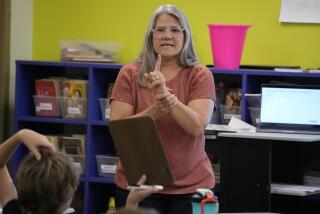Finding Just the Right Educational Software
- Share via
IRVINE — Heidi Sheldon knew her 4-year-old was bright, but she couldn’t seem to teach Siena the concept of addition and subtraction.
Then she bought “Peter Rabbit’s Math Garden” by Mindscape ($35). And what she couldn’t explain, Mrs. Tittlemouse could. The friendly, furry Beatrix Potter character had five creepy crawlers in her house, swept away two and asked Siena how many were left.
Suddenly, Siena smiled, as she clicked on the “3”.
“I saw a light bulb go on when she used this program,” Sheldon said. “And all I had to do was just sit there and say, ‘This is great.’ ”
It’s the scenario parents dream about when purchasing educational software for children. But Sheldon points out that she had wasted a lot of money on programs that bored her daughter before she bought Peter Rabbit from Bright-Ideas, a Massachusetts-based company that helps parents match programs to a child’s learning style.
In this $500-million educational software industry, the hit-and-miss approach can prove costly. Hundreds of companies nationwide offer as many as 9,000 titles at prices ranging from $30 to $40 apiece.
If you decide you have the courage to wade through the selections, begin by asking yourself these questions:
Do you want to cover a grade level (a hot area with many choices from reputable companies), introduce new subjects, teach concepts or reinforce math and phonics with skill and drill?
Does your child prefer a competitive game style of learning, a whimsical approach or a classroom style? Does your child’s comfort level increase with familiar characters such as Elmo and Madeline (Creative Wonders), Arthur and Dr. Seuss (Broderbund), Winnie the Pooh (Disney) or the Magic School Bus (Microsoft)?
Next, do a bit of research. You can check to see what your school is using and buy the same or choose supplemental programs.
Also, see what’s available free. Kidsoft puts out demos of more than 100 educational games on its Web site (https://www.kidsoft.com). Newsweek’s Parent’s Guide to Children’s Software site is https://www.newsweekparentsguide.com
Computer stores usually have samplers your child can test drive. Software companies often have Web sites that describe their products.
If it still seems too much, you can turn to BrightIdeas ([888] 4BIDEAS or https://www.brightideas.com). The company works as a personal shopper, whittling down the choices to a list of about 125. They evaluate your child’s learning style--linguistic, mathematical-logical, interpersonal, intrapersonal, spatial, bodily-kinesthenic, musical--and match a program to your child’s learning style.
Is Johnny having a hard time with multiplication? Before Julie Evans, BrightIdeas’ Mission Viejo-based national director of sales, would make a recommendation, she would determine if he’s a “linguistic learner,” in which case she would choose software with high verbal content such as Edmark’s Mighty Math Zoo Zillions ($35).
“A linguistic learner loves the sound of a voice. The thing I like about this program is it does actual talking back and forth, and it gives a feeling of having a private tutor,” Evans said.
But if he’s logical-mathematical, he may prefer Davidson’s popular Math Blaster series ($30 each). “It’s very pattern-oriented with a very logical outcome.”
Evans understands the difficulties parents have with picking software. She began consulting for the company three years ago when she was trying to figure out what software to buy for her own children, now 5, 9 and 11.
“We consider our niche to be helping parents make the best decisions for their children’s software,” Evans said. “We make it easy for people.”
BrightIdeas, which charges for the software but not the consultations, offers a full refund if the program doesn’t suit. It holds software parties in clients’ homes--like the Tupperware parties of old. The company also helped install Davidson’s Kid Phonics, Kid Phonics 2, Knowledge Adventure’s Jumpstart Kindergarten Reading and the new Jumpstart First Grade Reading ($30 each title) at Arroyo Vista Elementary School in Rancho Santa Margarita.
“Consumers are getting smarter,” Evans said. “Parents are tired of making bad investments.”
Keep in mind that it’s not only the precocious child who will benefit from the right program. Shirley Zweig taught reading to special education children at Santiago Middle School in Orange last year. She found “The Learning Company’s Storybook Weaver” ($29.95) invaluable not just in raising her students’ reading level but in building self-esteem.
“I had one particular girl who was very quiet and introverted and terrified of computers,” Zweig said. “Then I got her on this ‘Storybook Weaver.’ By the end of eighth grade she was a leader. The program took a lot of fear away.”






